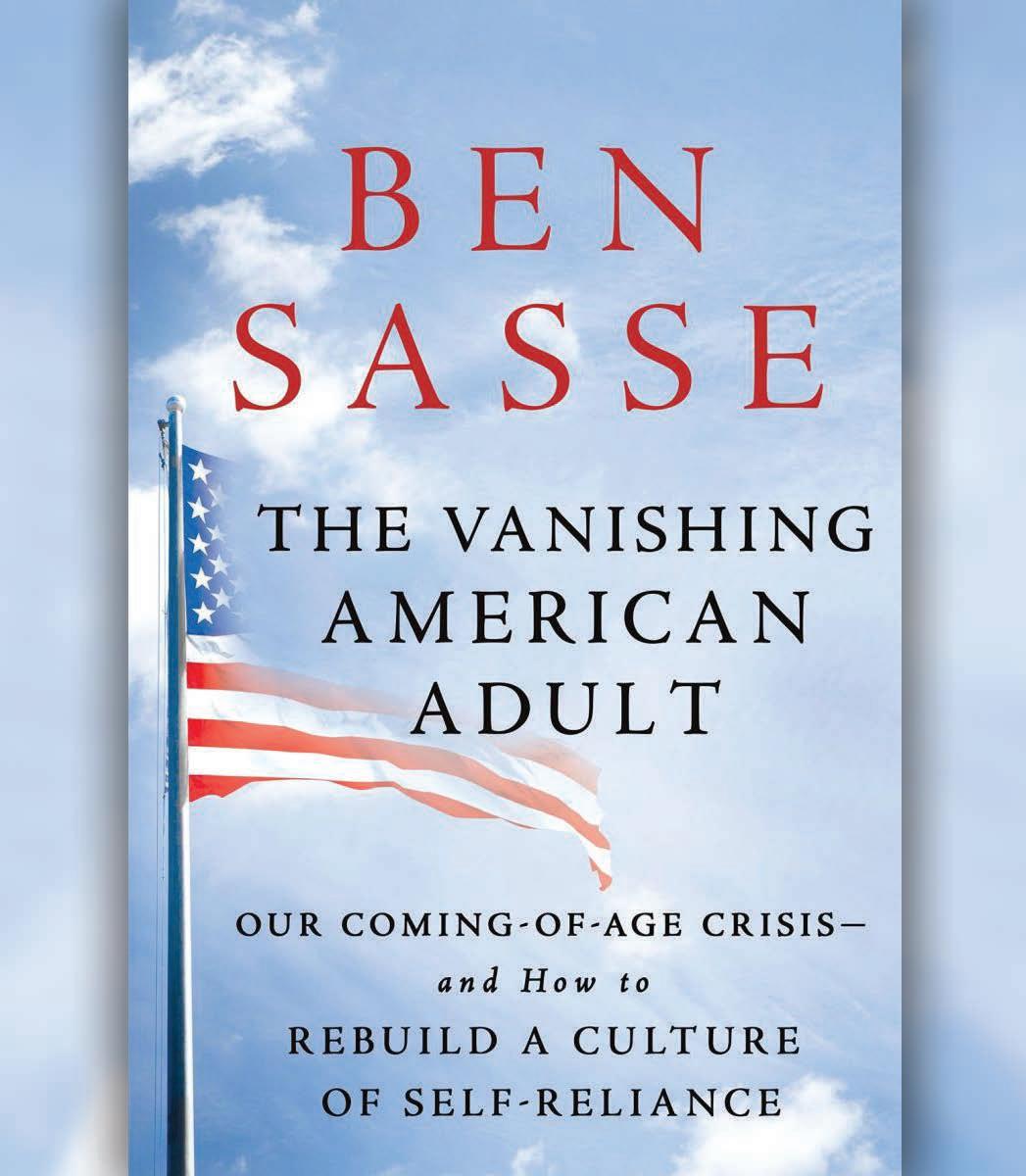
8 minute read
The Vanishing American Adult
The Vanishing American Adult
by Ben Sasse
REVIEW BY JEFF HUNT Director of the Centennial Institute
Parents, it’s time to step up and take a more intentional approach to raising your children and shaping their education. That’s the primary argument made in Senator Ben Sasse’s new book, The Vanishing American Adult, Our Coming-of-Age Crisis and How to Rebuild a Culture of Self-Reliance.
The root of the problem facing younger generations is that parents and adults have become passive. We’re passive in how we raise, educate, train, and prepare the next generation. We’ve turned over most of the responsibilities of raising our children to the public school system, and this isn’t by accident.
Senator Sasse, a former Christian college president, places the blame for many of our social and educational woes at the feet of the famed American educator John Dewey. Sasse argues that Dewey’s “overriding goal was universal education for a growing nation, but in pursuing it, he turned the school into the literal center of the world for children, crowding out roles and responsibilities traditionally carried out in families and communities. The school was no longer there to support parents, but to replace them.”
And to what end? Sasse points out that Dewey and his humanist colleagues sought to replace a religious worldview all together. “There is no God and there is no soul. Hence, there is no need for the props of traditional religion. With dogma … (now) excluded, then immutable truth is dead and buried. There is no room for fixed and natural law or permanent moral absolutes.” Dewey sought not only universal education but universal worldview change.
The result of Dewey and his humanist colleagues’ work, Sasse argues, is that our children are stuck in Neverland. They are softer, unprepared for the world.
Kids live at home longer, spend more time in front of screens, watch more pornography, and are less likely to get married, participate in church, and begin a career. “Childhood is no longer so much the nurturing, goaloriented period tapering by the late teens; it is instead an amorphous period between infancy and the age of 25 or 30, interrupted temporarily by the biological awkwardness of puberty.”
So what is Senator Sasse’s solution? Engagement. He recommends that we reestablish intergenerational connections, develop a strong work ethic, consume less and produce more, immerse our children in other cultures, build a family bookshelf, and recapture the ideas that made America great.
One of the areas of Sasse’s book that particularly struck a chord was his call to “flee age segregation.”
He points out that we have lost the connections between older and younger generations that were previously commonplace. “Today, young people’s lives are driven by one predominant fact: birth year. Instead of helping with the family business or apprenticing, teenagers are now hanging out, in person or online, with friends, most whom are their same age and school year. Correspondingly, senior citizens live out their years in nursing homes where they also interact mainly with their age peers.”
I agree that the segregation of society by age is dramatically harming family connections. Young

Young people are losing the opportunities to learn and be shaped by their grandparents.
A lifetime of wisdom is quietly fading away between the walls of our nursing homes.
– Jeff Hunt
people are losing the opportunities to learn and be shaped by their grandparents. A lifetime of wisdom is quietly fading away between the walls of our nursing homes.
For Senator Sasse, these intergenerational connections beget wisdom. Children learn from parents and grandparents that death is a central fact of life. This then allows young people to understand what it means to truly live well. It also reframes how young people understand sex. For younger, agesegregated generations, sexual intercourse is only about pleasure. But within the context of a multigenerational family structure, sex has a spiritual and covenantal component in addition to procreation and pleasure purposes. In other words, when your grandparents celebrate a 50th wedding anniversary, sex and marriage are far more meaningful.
Sasse believes we need to revisit the poetry of the Declaration of Independence, the Constitution, and our other founding documents. We also need to return to participation in civil society.

“The meaning of America is not in its government or its elected officials. It is in our civic organizations... it’s in the churches. It’s even in the juries.”
As Robert Putnam pointed out in his book, Bowling Alone: The Collapse and Revival of American Community, America is in decline in civic engagement and this has broad consequences. Membership numbers for Boy and Girl Scouts, fraternal organizations, church membership, service organizations, even bowling leagues are all in decline. This results in a loss of social capital, friendships, overall social and community health, and national identity.
As Senator Sasse closes his book, the final recommendation to rebuilding our culture is to recapture the civic ideas that helped establish the greatest country in the history of the world. Sasse claims that we have lost our American identity. “American exceptionalism is not some claim to ethnic or moral superiority; rather, it is a claim about the American Founding being unique in human history.”
We are fortunate that at such a time as this, Colorado Christian University is training up young people with a robust understanding of U.S. history and civic engagement. In fact, partly because of our history classes, The American Council of Trustees and Alumni (ACTA) has given Colorado Christian University an A rating for its core curriculum. CCU is one of only twenty-four schools in the country to receive this grade. When it comes to U.S. history, ACTA only gives schools credit for U.S. history “if they require a survey course in either U.S. government or history with enough chronological and topical breadth to expose students to the sweep of American history and institutions.”
In addition to our core curriculum, it is a Strategic Objective of Colorado Christian University to impact our culture in support of the original intent of the Constitution and to promote the ideas that formed Western civilization.
Furthermore, CCU students are expected
to complete 180 hours of ministry service in the community. This is because CCU believes that service is an opportunity to shape students as wellrounded, holistic individuals who are equipped for Christian leadership, trained with the skills needed for meaningful careers, and ready to actively engage in the world.
Overall, this book is a clarion call to parents to take ownership in raising their children but it is lacking in its complete understanding of the challenges facing future generations.
One area Senator Sasse misses are the few fathers left to help raise children. What I have called “The Great Desertion” is a culture with no accountability upon fathers. Today, it is perfectly acceptable for fathers to abandon their families with no consequences outside of small monetary fines for child support. Even in the case of child support, the U.S. Census Bureau reports that only “44% of custodial parents receive the full amount of child support.” This is leading to a generation of young people growing up without fathers.
According to Dr. Bradford Wilcox of the University of Virginia, “One Princeton study found that boys raised apart from their fathers were two to three times more likely to end up in jail before they turned 30.” He also points out that “girls whose fathers disappeared before the girls turn six were five times more likely to end up pregnant as teenagers than were their peers raised with fathers in the home.”
The Institute for Family Studies has compiled data to show that an absent father has dramatic effects on children in other areas. Children without stable fathers are more likely to struggle with mental health issues including substance abuse, are impacted when it comes to academic and career achievement, and are less likely to get married and produce stable families themselves.
Senator Sasse’s book is great if you have engaged parents. But what if the father of the family isn’t
engaged? The book doesn’t offer much of a solution. Unfortunately, this is becoming more and more of a reality for America’s youth.
Senator Sasse’s book is an important challenge for parents to engage seriously with their children. Shut off the TV, attend a PTA meeting, help with homework, introduce your children to hard work, civic responsibility, religious values, and ultimately guide and direct your children’s lives. We cannot allow public institutions that are becoming more secular, atheistic, and individualistic by the minute to be the primary forces shaping our children. God has entrusted us with the call to guide the minds and souls of our children. As Charles Spurgeon, the famous preacher put it, “You are as much serving God in looking after your own children, and training them up in God’s fear, and minding the house, and making your household a church for God, as you would be if you had been called to lead an army to battle for the Lord of hosts.”
REVIEWER BIO

JEFF HUNT
Jeff Hunt (MPS, George Washington University) joined Colorado Christian University in 2015 as director of the Centennial Institute, the University’s public policy think tank. He has served as media coordinator for the Senate Republican Conference, director of operations of the Clapham Group, special assistant to Senator Rick Santorum in his 2012 White House bid, and director of Colorado Coalitions for Mitt Romney’s presidential campaign.








